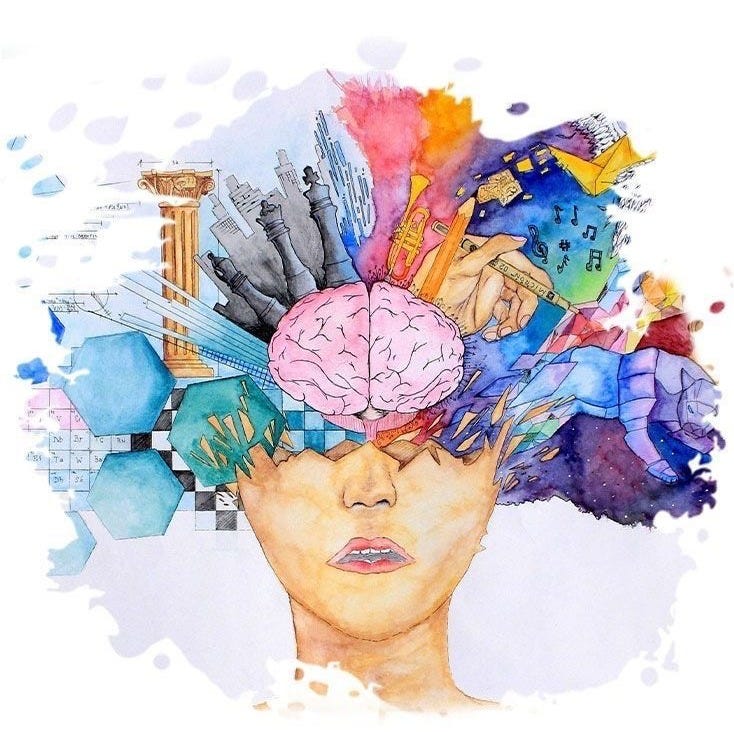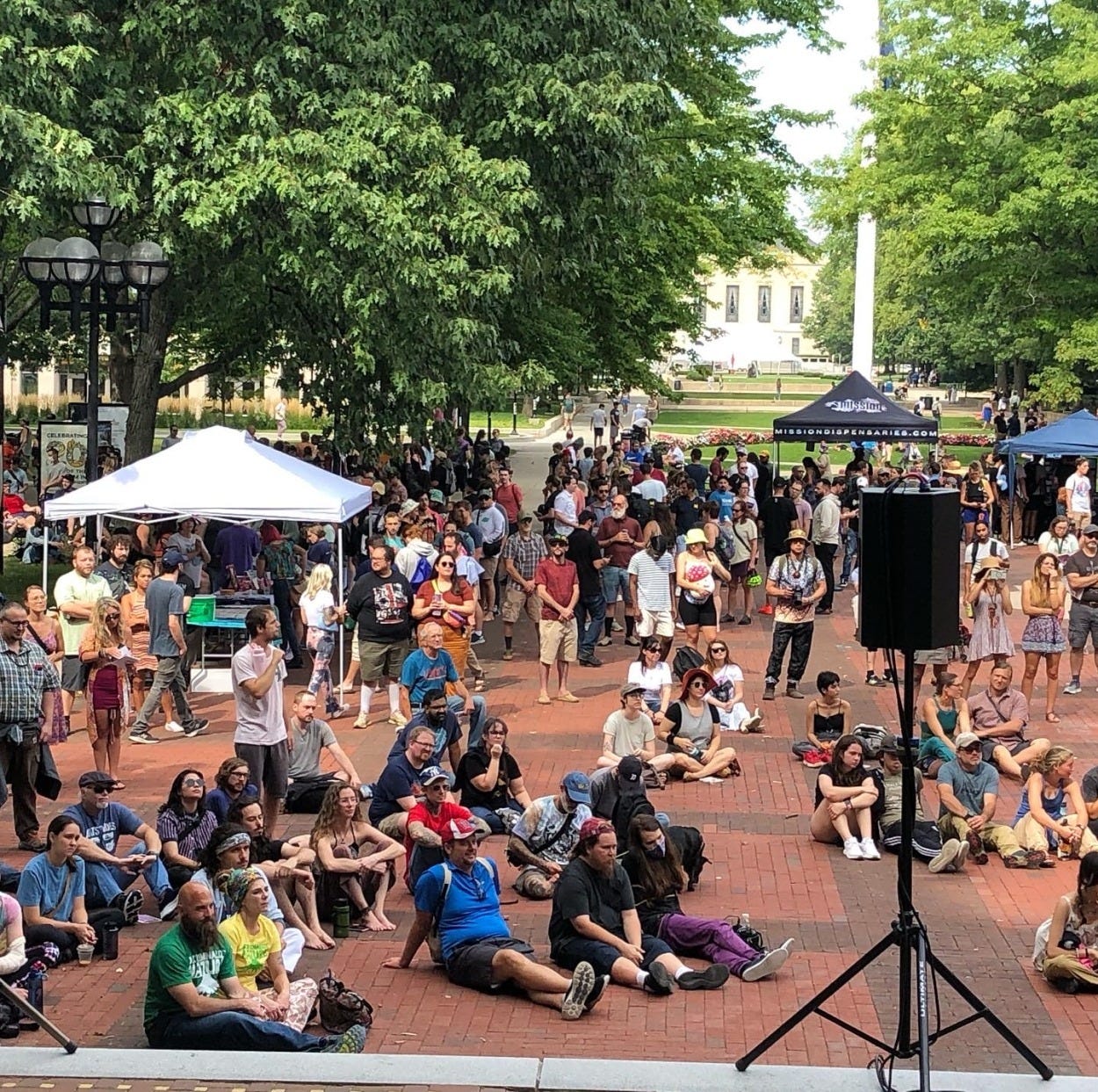On Changing Minds About Entheogens
A rant and a meditation
How many people experience, at least once in their lifetime, a significant psychological event—one that forces them to deconstruct a fundamental worldview or belief system? An event that cracks the mind open, requiring a deep reconsideration and reconciliation? How many people have truly changed their minds?
These were the questions on my mind this weekend as Joseph and I began the work of talking to city council members and candidates, introducing the idea of decriminalizing entheogenic plants and fungi.
Entheogen.
The word slips off my tongue easily. Its meaning feels intuitive to me. I’ve thought through the issues surrounding these substances from every angle, and I’ve experienced firsthand their powerful, mind-changing effects. But I know that, for most people whose minds we hope to change, the word might as well be Greek.
Well, to be accurate, it is Greek.
The word "entheogen" is derived from two Ancient Greek words: ἔνθεος (éntheos) meaning "full of the god, inspired, possessed," and γενέσθαι (genésthai) meaning "to come into being."1 The term was coined in 1979 (the year after I was born) by a group of ethnobotanists and scholars of mythology to describe psychoactive substances used in religious or spiritual contexts. These substances can occasion experiences that a skeptic might describe as purely hallucinogenic, but that a believer might call mystical.
Why Are These Substances Still Illegal?
The politics of entheogens run deep. Why did these natural substances land on Schedule 1 of the Controlled Substances Act—a classification reserved for the most dangerous drugs, like cocaine and heroin? Substances that, if the government is to be believed, have no known benefits and high potential for abuse. Why does mere possession of these plants or fungi carry the potential to ruin a person’s life, leading to felony convictions which often mean jail time, loss of employment, voting rights, parental rights, and travel freedom? Even with decades of evidence showing entheogens possess great potential for benefit and low risk for addiction, why has the federal government taken no steps to reschedule or legalize them?
When I tried to start a conversation with a local candidate for municipal office, I was struck by the realization that not only had he never considered these questions, he had never even heard the word “entheogen.” I had to resort to saying "magic mushrooms," a word heavy laden with derogatory associations, just to get my point across. With so little time to speak, my elevator pitch led to frustration for me, and standoffishness for him.
In fact, he told me bluntly that even talking to Decriminalize Nature, NW Arkansas in any official capacity might give people “the wrong idea” and give his opponent ammunition against him.
What are we, the plague?
It was only a first attempt, but it felt like banging on a concrete wall. Sometimes, I wonder if Timothy Leary’s famous (though mythic) idea of slipping LSD into the nation’s water supply was born of a similar frustration. (In reality, while Leary spoke provocatively about mass consciousness expansion in the 1960s, dosing anyone without consent was never part of his platform.)
Joseph listened patiently as I vented my frustration, then gently pulled me back from my intrusive fantasies of secretly dosing the mayor and city council with psychedelic tea.
“You’ve already deconstructed major systems of thought several times,” he reminded me. “You’ve changed your religious beliefs, left your marriage, changed your politics. Imagine if you had never been forced to change any of those things. Imagine a world that has only ever upheld everything you’ve believed since you were young. Try to remember what life was like before your faith crisis.”
I thought back. Back to when I judged my best friend for wearing a skirt I deemed too short. Back when I sent money to California lobbying groups to support Proposition 8. Back when I believed that I belonged to the only truly and living church on the face of the earth.
I was, frankly, an asshole.
Or at the very least, I was closed. Narrow-minded. Blind to a world I couldn’t see until my mind opened—just a crack.
The Reality of Changing Minds
Joseph’s words of caution have been a recurring theme this week, pulling me back to reality as I eagerly explore potential partnerships. At one point, while I was researching a local coalition for criminal justice reform, he warned, “Don’t be surprised if they aren’t immediately on board.”
Ugh. Did he really have to lead with that? Couldn’t he have said, “That’s an interesting idea. What is their mission? Who’s in charge? Where you do see possible intersection in their mission and ours?” Did he have to pop my balloon before I even had a chance to enjoy it?
I mean, I appreciate what he’s trying to do.
Admittedly, I have a sometimes overly optimistic tendency to assume that once I state our case and provide a bit of research, everyone will enthusiastically jump on board. “Hey everybody!” we’d shout, linking arms and singing Cumbayah. “The War on Drugs didn’t work, and now we can stop enforcing a mad law in a mad world. Doesn’t this make so much sense?”
In fact, twenty-seven cities across the United States have decided that yes, it does make sense. At the city council level, these communities have pressed pause on enforcing unjust laws banning entheogens through a simple resolution stating that:
The investigation and arrest of individuals involved with the personal use, growth, and possession of entheogenic plants and fungi should be the lowest priority for local law enforcement.
In places like Ann Arbor, Michigan, Olympia, Washington, Portland, Maine, Cambridge, Massachusetts, and Oakland, California, people have come “out of the woodwork” not only to testify and to support the effort, but to help create local infrastructure for education, guidance, and integration.
These cities have not reported increases in criminal activity. Instead, they have created spaces where people can engage with these sacred plant medicines responsibly.
So why not here in Northwest Arkansas, an oasis of progress in a historically conservative state?
Not that this is a partisan issue. At least, it shouldn’t be. But it became one a little over fifty years ago, thanks to Richard Nixon, who lumped these natural plants together with marijuana and other synthetic drugs, and turned them into political weapons. In a now-famous confession, Nixon’s domestic policy adviser, John Ehrlichman, admitted:
“You want to know what this was really all about? The Nixon campaign in 1968, and the Nixon White House after that, had two enemies: the antiwar left and black people. You understand what I’m saying? We knew we couldn’t make it illegal to be either against the war or black, but by getting the public to associate the hippies with marijuana and blacks with heroin, and then criminalizing both heavily, we could disrupt those communities. We could arrest their leaders, raid their homes, break up their meetings, and vilify them night after night on the evening news. Did we know we were lying about the drugs? Of course we did.”
It’s a quote I often incorrectly assume everyone has heard. But most people haven’t, and still assume there must have been some good reason for making these plants and fungi illegal. I mean, they make people hallucinate. And that’s obviously a bad thing, right?
Sigh. Back to square one.
It’s not the first time I’ve faced disappointment. When I recently approached a friend running a nonprofit dedicated to helping families discuss drug use with their kids, she expressed hesitation about supporting decriminalization of entheogens. Even though substances like ibogaine have shown promise in treating addiction2, the topic felt too polarizing for her.
And again last week, a lovely discussion and attempt at collaboration ended with the apologetic words, “We try to stay away from political issues.”
Must I repeat myself?
This is a public health issue. This is an issue of criminal justice reform. This is an issue of personal and spiritual freedom.
But I get it.
Plants and fungi that change our consciousness trigger deeply ingrained, automatic reactions and associations. Woodstock. Hippies. Free love. Bad trips.
Scary.
“Don’t be surprised,” says Joseph once again. I think he’s getting tired of the flubbing sound of my quickly deflating balloons of hope. He’s trying so hard to help me adjust my expectations and prepare me for the worst.
But I don’t want to prepare for the worst. I want to believe in people’s capacity to change their minds.
Today, I dropped off a packet of information for the municipal candidate who hadn’t heard of entheogens. I included a folder of research, a copy of How to Change Your Mind, and a handwritten notecard decorated with mushrooms.
I slipped through the gate, half-worried I was crossing a line, and left the package on the doorstep. Then I turned and walked away quickly, trying not to look like I was ding-dong ditching. When I got back to the car, I let slip a tear or two—not out of fear or despair, but because I felt a rush of conviction, a deep sense that giving up wasn’t an option. As the late, great Terence McKenna once said, “Nature loves courage.” And I felt like nature loved me for trying.
Ultimately, I don’t think we can change anyone else’s mind. My own paradigm shifts were never the result of someone else’s rhetorical prowess. My mind was changed by me, in a confluence of events and information that no one could control or predict.
I think back to the moment that I lost my religion. It was like a rock hitting my windshield on the freeway, which created a chip that spread and shattered the entire piece of glass in a matter of moments. And the proverbial chip wasn’t the evidence or the arguments. It was a question:
“Is it possible that I could have been wrong?”
I didn’t realize at the time what a brave question that was, and how few people ever ask it honestly of themselves.
Joseph himself said that my leaving the Mormon church was something he never would have guessed in a million years. It was the ultimate surprise. A surprise which, in the end, helped him to change his mind too.
“Are you going to be okay,” he asked me, “if you don’t see the fruit of your labors, but someone else does?”
The thought made me sad. It made me wonder whether all this is worth it. But only for a moment.
“I suppose I have to be okay with it,” I sighed. “Even if that’s the case, this is still worth doing.”
“Just don’t be surprised,” Joseph said again, “if people don’t change their minds.”
“Ok,” I said. Then added with a smile, “Just don’t be surprised if they do.”
https://psychonautwiki.org/wiki/Entheogen
Brown, T. K. (2013). Ibogaine in the treatment of substance dependence. Current Drug Abuse Reviews, 6(1), 3-16. doi: 10.2174/15672050113109990001





I have been having similar thoughts around the question “what if I am/was wrong?” lately. It’s an important question, maybe one of The Most Important questions we can all ask ourselves these days.
Look at Dr. Ford’s inquisition and the decision that followed so many years after Anita Hill. Change takes decades, or longer, and I suspect you are correct in the hypothesis that we need our own personal wake-up call to help propel it forward.
Thank you for always being brave and speaking your truth.
This is so beautifully written as always. The subject matter is not only important, it feels vital for us to come into sanity around this issue. Thank you so much for your efforts, intelligence, and authenticity around this issue. I am sending so much light to you and your work.